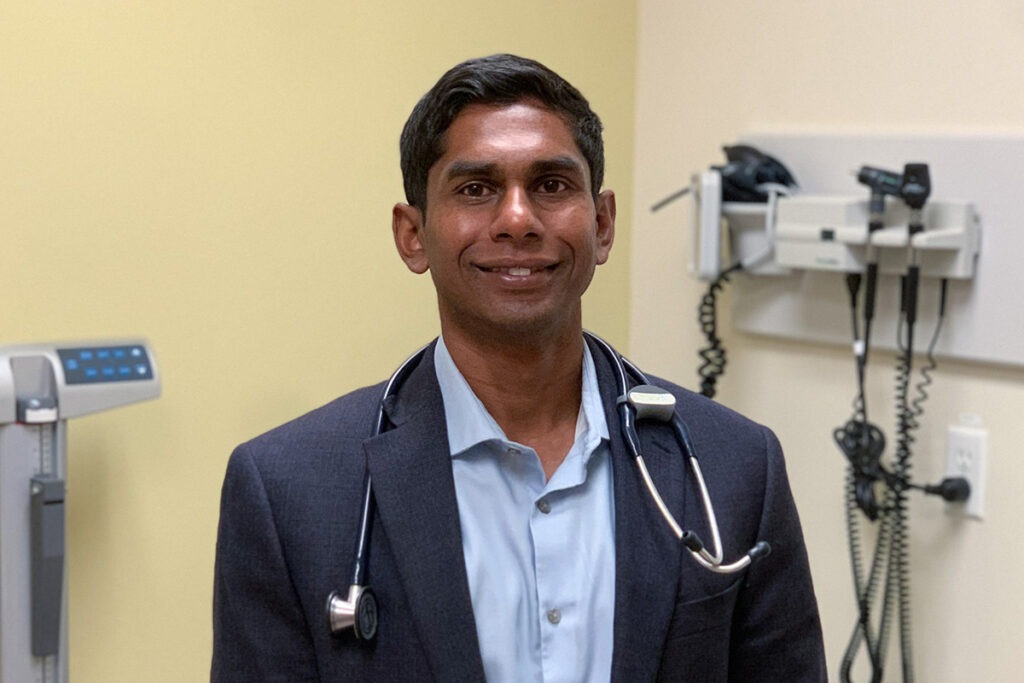From the Desi News article
A superhero’s cape would not be out of place for a champion of patient safety, social justice and health equity.
As such, Canada Research Chair in Health Justice is a fitting mantle for Dr Nav Persaud, who has made a name for himself for tirelessly advocating for health equity.
A scientist with MAP Centre for Urban Health Solutions in the Li Ka Shing Knowledge Institute of St. Michael’s Hospital, he is a staff physician in the Department of Family and Community Medicine at the hospital, and was named one of Canada’s Top 40 under 40 in 2017.
His mandate as Canada Research Chair in Health Justice is to conduct research and do academic work to bring us all closer to fair health outcomes.
“Right now in Canada, there are different outcomes depending on income, whether one is racialized, one’s gender, etc. Despite publicly-funded social supports and access to health supports, disparities exist.
“I am working to narrow the health gap between the highest and lowest wealth brackets, ensuring that everyone can afford the medication they need.”
It all began with his patients who couldn’t afford the meds he was prescribing. They returned to the clinic repeatedly with the same issues and he watched, helpless, as some of them ended up in the hospital with a cardiac arrest or a stroke.
“Everything I had learned at medical school was wasted if I couldn’t help my patients – but the bottom line was that for many of them medications were out of reach.”
He found this unacceptable when relatively inexpensive treatments could prevent it.
Dr Persaud knew he had to try something different.
To this end, he led the first-ever trial providing people with free access to essential medicines. In 2016, he launched the CLEAN Meds (Carefully selected and Easily Accessible at No charge Medications) study to test the effects of providing essential medicines for free to patients who were unable to afford them. Almost 800 people took part in the study through health centres in Toronto and Manitoulin Island area.
The results from the first 12 months of the study proved beyond a shadow of doubt that access to free medication improves health outcomes. Dramatically. There was a 44 per cent increase in people taking their medications and 160 per cent increase in the likelihood of participants being able to make ends meet.
He also worked with WHO to decide which essential medicines – everything from antibiotics and pain relievers to medications for HIV-AIDS – countries should cover.
Combler les lacunes dans les soins de santé
Tiré de Desi News
La cape d’un superhéros conviendrait parfaitement à un champion de la sécurité des patients, de la justice sociale et de l’équité en matière de santé.
À ce titre, la Chaire de recherche du Canada sur la justice en santé est un choix approprié pour le Dr Nav Persaud, qui se distingue en défendant inlassablement l’équité en matière de santé.
Scientifique au Centre MAP pour des solutions de santé urbaine du Li Ka Shing Knowledge Institute de l’hôpital St. Michael, le docteur Persaud est membre du personnel du département de médecine familiale et communautaire de l’hôpital, et il a été nommé parmi les 40 meilleurs médecins de moins de 40 ans du Canada en 2017.
Son mandat en tant que titulaire de la Chaire de recherche du Canada sur la justice en santé est de mener des recherches et d’effectuer des travaux universitaires permettant de parvenir à des résultats équitables en matière de santé.
« À l’heure actuelle, au Canada, les résultats diffèrent en fonction du revenu, de l’appartenance raciale, du sexe, etc. Malgré l’accès aux programmes sociaux et aux services de santé financés par l’État, des inégalités demeurent.
Je m’efforce de réduire l’écart qui existe en matière de santé entre les classes de revenus les plus élevées et les plus basses, en veillant à ce que chacun puisse se procurer les médicaments dont il a besoin. »
Tout a commencé avec des patients qui ne pouvaient pas se payer les médicaments qu’il prescrivait. Ces derniers se présentaient à la clinique à plusieurs reprises pour les mêmes problèmes et il assistait, impuissant, au fait que certains d’entre eux se retrouvaient à l’hôpital à la suite d’un arrêt cardiaque ou d’un AVC.
« Tout ce que j’avais appris à la faculté de médecine était en vain si je ne pouvais pas aider mes patients; mais le cœur du problème était que pour plusieurs d’entre eux, les médicaments étaient inaccessibles. »

